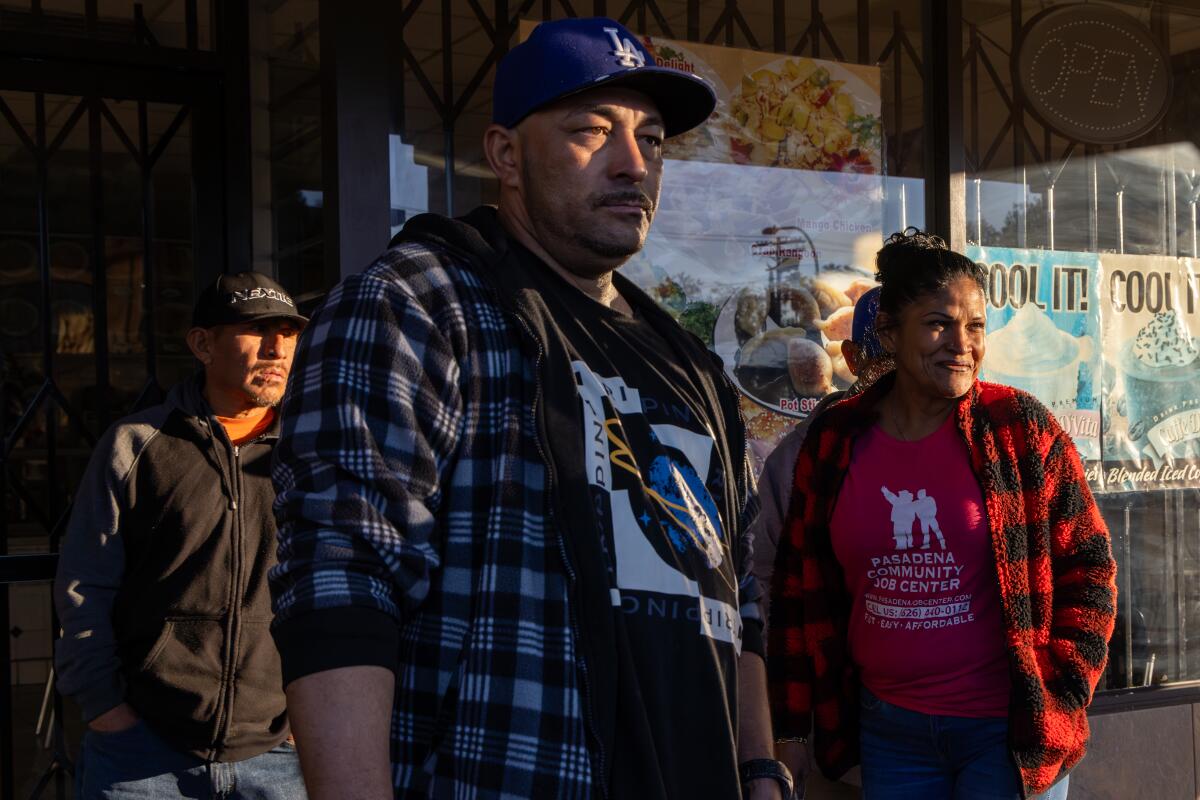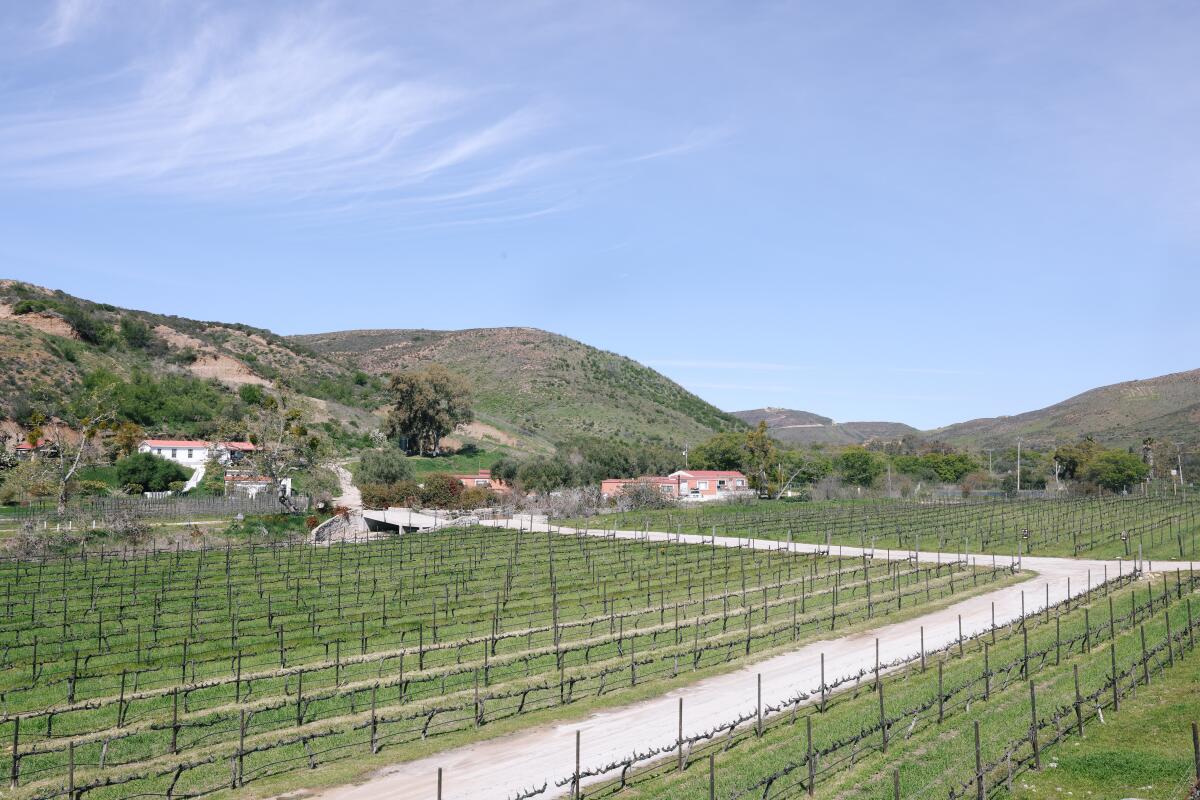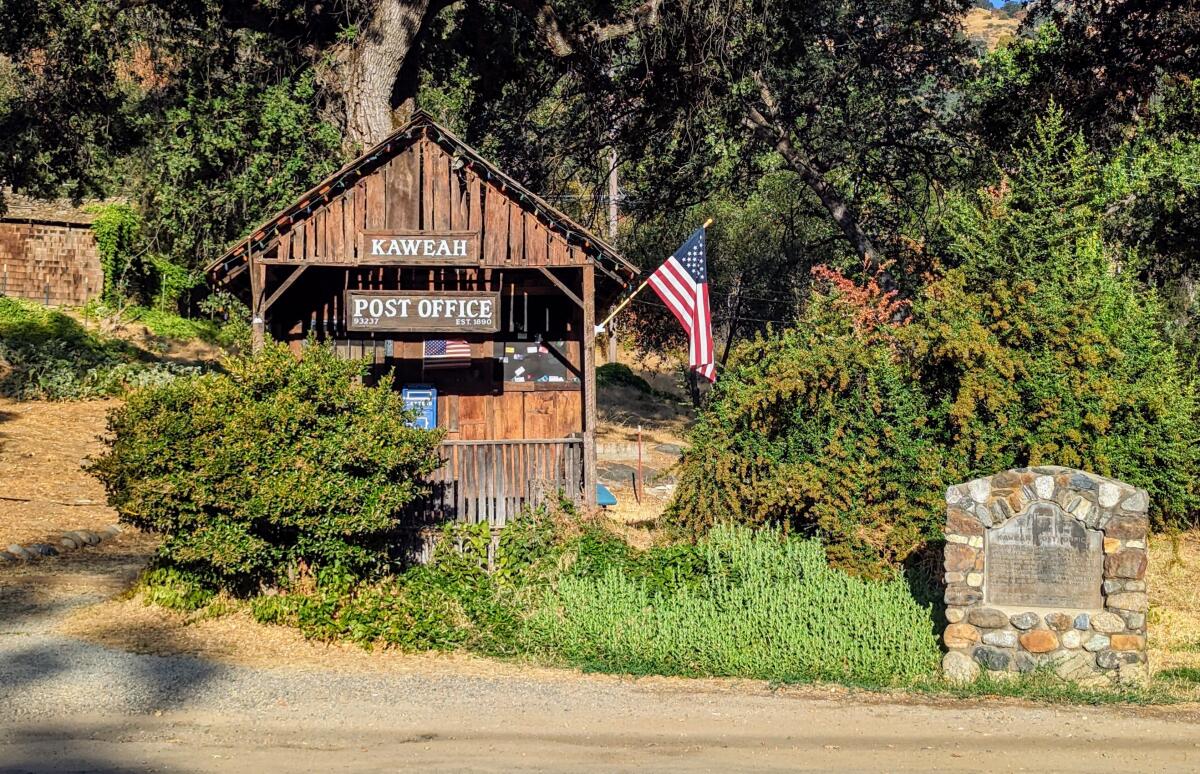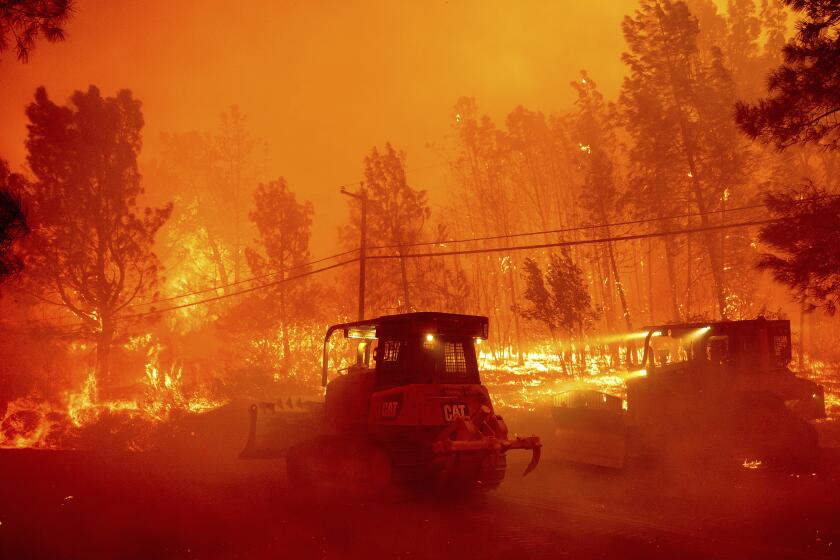Migrants face harsh conditions as they await official processing in San Diego desert camps

Good morning. It’s Wednesday, Nov. 29. Here’s what you need to know to start your day.
- A migrant crisis in San Diego County as unofficial camps grow
- Day workers reflect on gross, odd and sometimes illegal jobs they’re asked to do
- 30 dazzling holiday light displays that make SoCal shine
- And here’s today’s e-newspaper
Sign up for Essential California
The most important California stories and recommendations in your inbox every morning.
You may occasionally receive promotional content from the Los Angeles Times.
A migrant crisis in San Diego County
Jacumba Hot Springs, about halfway between San Diego and Calexico, has become a makeshift detention site for a growing number of migrants seeking asylum in the U.S. The population in the open-air desert camp has roughly doubled over the last few months.
U.S. Border Patrol agents monitor the camp in southeastern San Diego County, but they don’t officially run it. Agents provide the migrants wristbands with their arrival date and order them to stay put until they can be transferred to an official processing facility.
“Often, women and children get picked up quickly,” Times reporter Melissa Gomez wrote in a story published this week. “But for many others, their time at the camps can stretch for days.”
Melissa described the harsh conditions that migrants face when they arrive at one of the three area camps:
“Once on American soil, the migrants subsist in makeshift open-air camps, where the number of tents are not nearly enough for the number of migrants. For warmth, they huddle around campfires fueled by brush and felled trees. When it’s time to sleep, many are left to rely on plastic tarps and thin blankets to shelter them from the wind and nighttime lows that can fall below 40 degrees.”
Many refugees arrived from countries including Colombia, Guatemala, Honduras and Peru. But a growing number of people are Chinese migrants, Melissa noted.
A senior Customs and Border Protection official who spoke with Melissa on background said agents are providing migrants essential provisions, including water, but it’s been the bare minimum. The official said the agency is spread thin and not equipped to handle the surge in migrants crossing the border in southeastern San Diego County.
Local volunteers from immigrant rights groups have stepped in to help feed, clothe and provide tents.
One volunteer, Chelsie Ruiz, cooks large batches of beans that are served to the camp dwellers as their afternoon meal — one of the two they get each day.
“People keep claiming this is a political issue,” Ruiz told Melissa. “No, this is not politics. These are my legit neighbors. I was taught to love my neighbor.”
Despite that local aid, there’s not enough to go around and some migrants are still going hungry, Melissa reported.
And as hundreds of people face days of exposure to the desert elements with limited water, food or shelter, volunteers expressed disappointment in governments’ minimal response.
“We’ll keep spending the money to make sure people can survive. ... But it’s not sustainable,” Erika Pinheiro, executive director of nonprofit legal advocacy group Al Otro Lado, told Melissa. “It’s just been maddening to see all levels of government point the finger at each other and try to absolve themselves of the responsibility of these individuals trying to seek asylum.”
Today’s top stories

- After four day laborers were hired to dump bags of body parts, others recount stories of strange, and sometimes illegal, jobs they were hired to do.
Climate and environment
- From decarbonization to electric cars, California hopes to showcase its climate leadership at the annual U.N. climate conference that will begin this week in Dubai.
- A California dry farmer’s juicy apples show how agriculture can be done with less water.
- The National Park Service wants to plant sequoias. Environmentalists are suing, saying say there’s no need to butt in.
Courts and crime
- Ron Jeremy’s alleged victims share their fury and acceptance after the latest twist in the court case.
- Daryl Hall’s reason for seeking a restraining order against former music partner John Oates has been revealed in new court documents. It’s all about business.
- The family of slain Palmdale deputy filed a $20-million claim against L.A. County for wrongful death. They are alleging that he worked so much forced overtime that he couldn’t stay alert against threats.
- Gov. Newsom announces a plan to crack down on a deadly street drug known as ‘tranq.’
- Newport Beach police probe allegations NBA’s Josh Giddey had a relationship with a minor.
Obituaries
- Charles Munger, longtime investment partner of Warren Buffett, has died.
- Roslynn Alba Cobarrubias, media entrepreneur, has died at age 43. She was known for her promotion of Filipino American culture through the music industry.
- Marty Krofft, the TV creator behind the children’s shows “H.R. Pufnstuf” and “Land of the Lost,” has died. He was 86.
More big stories
- A massive fire destroyed several South L.A. homes in ‘a blink of an eye.’
- California vs. Florida: Why are people moving from one state to the other?
- Suicides in the U.S. hit a historic high in 2022, driven by an increase among older adults.
- L.A. City Council approved a law requiring Airbnb hosts to get police permits. The permit requirement will help the city crack down on party houses and properties that draw illicit behavior.
- A Southern California resident is celebrating after four relatives were released from their long captivity in Gaza following Hamas’ attack on Israel.
- Silicon Valley executive Lexi Reese drops out of the U.S. Senate race.
- ‘Renaissance: A Film by Beyoncé’ delivers a concert experience and the sweat behind it.
Get unlimited access to the Los Angeles Times. Subscribe here.
Commentary and opinions
- Ashley Lee: Broadway hasn’t always shown up for female fans. A surprise smash proved their power.
- Jonah Goldberg: Has the Democratic Party been led astray by progressive activists?
- Mark Z. Barabak: Take this Congress and shove it! Two fed-up lawmakers say why they’ve had enough.
- Bill Shaikin: Wait for the A’s to leave? Oakland is bringing in another baseball team next year.
- Michael Hiltzik: This lawsuit has the NCAA staring down extinction. Is that a bad thing?
Today’s great reads

Tourists are flooding Mexico’s wine country. They’re
also destroying it. Vintners, conservationists and environmental studies argue that if growth and urbanization continues unabated, the pressures on the core industry will result in the region ceasing to be a wine region.
Other great reads
- 20 years on, a transformed New Zealand looks back at ‘Lord of the Rings’.
- Mariachi Plaza is home to musicians and skaters. Steve Corona is bridging the gap.
- How a DACA recipient and former street vendor landed his first lead movie role.
- Café Tropical, a Cuban staple in Silver Lake, is closing its doors.
- When your world feels out of control, can forest therapy help?
How can we make this newsletter more useful? Send comments to essentialcalifornia@latimes.com.
For your downtime
Going out
- 🎄 30 dazzling holiday light displays that make SoCal shine.
- 🍕🍜 Where to eat while you’re holiday shopping.
- 🎟️ The 3-day SoCal resident ticket returns to Disneyland, starting at $75 per day.
Staying in
- 🎥 Taylor Swift’s “The Eras Tour” movie will start streaming (on-demand) on her birthday.
- 💿 Jennifer Lopez’s album “This Is Me ... Now” is getting a 2024 release — and a companion movie.
- 📚 10 books to add to your reading list in December.
- 🍲 Here are some recipes for fall soup.
- ✏️ Get our free daily crossword puzzle, sudoku, word search and arcade games.
And finally ... a great photo

Today’s photo is from Jared Cohee of Los Angeles: Kaweah Post Office in Three Rivers, Calif. Jared writes: “Three Rivers serves as a gateway to Sequoia National Park, and many travelers stay here before or after visits, but the permanent community is growing rapidly as well, unlike many other small towns in rural places. Be careful of the cobwebs when you drop your mail off in the vintage letter box!”
Have a great day, from the Essential California team
Ryan Fonseca, reporter
Elvia Limón, multiplatform editor
Kevinisha Walker, multiplatform editor
Laura Blasey, assistant editor
Check our top stories, topics and the latest articles on latimes.com.
Sign up for Essential California
The most important California stories and recommendations in your inbox every morning.
You may occasionally receive promotional content from the Los Angeles Times.





